www.albertocontadornotebook.info - Alberto Contador Fans Notebook
 contadorfans@hotmail.com
contadorfans@hotmail.com
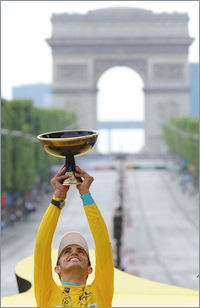
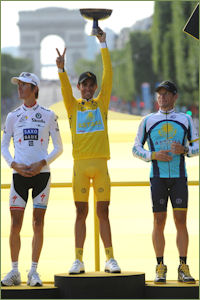
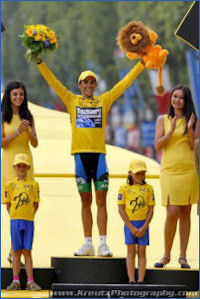

VISIT THE OFFICIAL WEBSITE

INTERVIEW: L'EQUIPE, SUNDAY PRINT EDITION
October 4 - Contador: “I said to myself: I’m stopping”
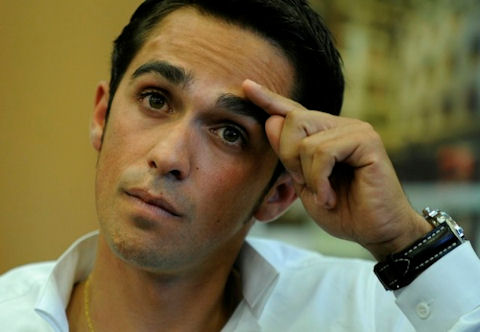
Alberto Contador has readily discussed the clenbuterol incident with the press (Pedro Armestre/AFP/Getty Images)
L'EQUIPE - Pinto/October 3, 2010 - Alberto Contador, temporarily suspended by the UCI, thinks he is the victim of an injustice. He even considered stopping.
For the past three days the lobby of hotel Las Artes in Pinto, a Madrid suburb, has been packed. Alberto Contador is the local kid, subjected to solicitations from all sides since his temporary suspension by the UCI, following abnormal analyses revealing the presence of clenbuterol in his urine, as a result of testing during the Tour de France. In the face of adversity, he chose not to remain silent. He is expecting German TV channel ARD, which precipitated the announcement. Friendly, but obviously hurt, the three-time Tour winner speaks in a determined voice. Without any of his inner circle nor lawyers by his side, and without trying to wiggle out of it: “All the time and the questions you want.”
What is your state of mind?
I’m very sad. I’m disillusioned by this small cycling world. This helplessness in the face of what’s being said and written is terrible. Even more terrifying since I’ve always encouraged the fight against doping, and now things are turning against me. But I hope this episode will make me even stronger.
On August 24th, Mario Zorzoli (UCI’s doctor) phoned to inform you that some clenbuterol had been found in your urine during the Tour. What was your reaction then?
At first he said that there had been an abnormal test result without mentioning the substance. I answered it was impossible, totally impossible! That there must be some mistake! He told me we should meet and that he’d explain because the situation was complicated and different from typical cases. We met two days later. For forty-eight hours I was in total incomprehension. I said to myself: I’m stopping it all. I saw children around my house on their bikes imititating me and I was tempted to tell them: “Forget about it. Don’t try to be a champion and do your job correctly. This world is unfair”.
You put forward a food contamination as justification. How did you reach that conclusion?
When I told the news to the only two people who are close to me (his brother Fran and his press manager) they both said simultaneously “You must have eaten or drunk something rotten”. I thought long and hard about what I been doing the day of that test (July 21), and after an hour and a half a bell rang. It could only have come from the meat brought from Spain which I’d eaten two days in a row. I did not see, and still don’t see, any other explanation. But I note that the simplest of explanations doesn’t seem to be accepted. It’s not really fair.
The idea of unfairness often comes back…
This is the reality as I feel it. Climbing the Tourmalet is hard work, extremely hard. I dig deep into my resources to achieve it, and I know very well the sacrifices and hours of training it requires. So when you’re told something totally unreal….
Between Zorzoli’s call and the news made official, almost a month elapsed. How did you live through that period?
Almost a month and a half of suffering. Only my brother Fran, my lawyer, and my press man were in on the secret. The UCI and WADA had assured me they’d keep the matter confidential until it was cleared. And one day, I was told that there were rumours circulating, especially in Germany. It was a relief because I could no longer remain silent. I needed to relieve myself of the weight of the injustice. I had nothing to hide and wanted full transparency. Because during that time I was solicited from all sides: my sponsors, to attend the Vuelta, etc. I had to keep smiling and act as if everything was fine.”
How many times were you tested during the Tour?
I don’t know exactly. Testing is an eveyday thing for me: I had six blood tests during the Tour. The final seven days I was tested eight times, including two blood tests. There is not the slightlest abnormality in my biological passport. I also had four tests during the Dauphiné, before the Criterium International. I also went through a lot of tests during the Vuelta a Castilla y León, Paris-Nice, and Volta ao Algarve. Not to mention all the unexpected tests at home. I’m one of the five most tested athletes in the world. Do you think I’d take the risk of doing anything wrong?
You would have preferred the matter being resolved before its disclosure?
Of course. I was in contact with the international bodies. I had entrusted the file to experts. I wanted everything back to normal fast. I’m still confident that the UCI and the WADA will make a right and fair decision…
Were you afraid when you appeared in public last Thursday?
I measured the impact it could have. But it had to come out. I was there to explain, to answer questions without hiding anything. In Spain I’m a public figure and I couldn’t wiggle out of it. But deep inside me, the hardest thing to bear was knowing how it would be for my family, the people I love.
What do you think about the revelations in L’Equipe concerning the examinations performed on your urine samples by the Cologne(*) laboratory?
I didn’t read them but was informed. It was a devastating blow. Your newspaper has considerable weight in the sporting world. Accusations based on a hypothesis can be very harmful! I respect everybody’s work. It’s just that I’d like this kind of information to be handled with extreme caution. It can lead to huge damage. If I’m ever found guilty, then an innocent person will have been condemned.
How much of your credibility remains in the eyes of public opinion?
Against the power of the media, the credit runs out. Facing the public, it does not. I know I have done nothing wrong and must fight. I was not that mad, when I renewed my contract with Astana, to ask the addition of provisions stipulating that if any doping problem emerged, I would leave the team. It was my way of asserting my commitment to anti-doping. I have gone through some difficult moments in my life. I’m a rider with a sense of responsibility. I’m a rider with clear ideas. I don’t care if I finish 20th in a race without ever touching banned products.
Whatever the outcome of the case, do you think your image is tarnished for ever?
The damage is done for me and for cycling once again. It’s damaging for me and for the credibility of the Tour. It’s damaging for me and for all the teams. Everything I have sacrificed for this sport has unjustly been swept away in two days: I don’t accept it. I can only fight for the truth to prevail. But the harm done to me is incalculable.
Do you still want to be a cyclist ?
It’s a question I don’t ask myself because I'm fighting for my innocence to be proven, (with sobs in his voice) but for weeks there’ve been times when I wanted to kick my bike. And then I calm down. Because it’s also in these moments that one must prove that one is a champion.” (Interview by Manuel Martinez for L’Equipe)
*Traces of plastic, the same as the ones found in blood bags, were identified in his urine samples, according to a method for detecting blood autotransfusion that has not yet been been validated.
Sincere thanks to Christine Kahane for translating this important interview from the French.
TOUR DE FRANCE 2010
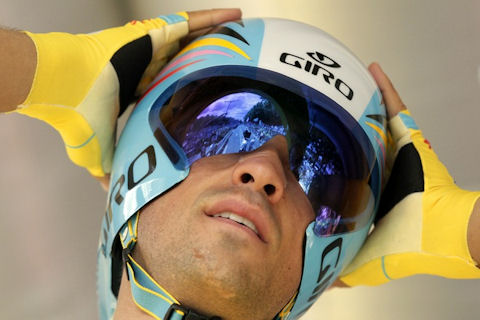
Contador makes last-minute adjustments in the start house, Stage 19
(Joel Saget/AFP/Getty Images)
DISCLAIMER : albertocontadornotebook.info is compiled by Rebecca Bell. The aim is to celebrate the achievements of Alberto Contador. Responsibility for all content lies with Rebecca Bell. Information and photographs is gathered and reproduced in good faith from published sources (online and print). The editors’ decision is final. We always seek to credit photographs where possible. On occasion, the original source of photography may not be available. If we have used your photos, please contact and we’ll be pleased to credit your work.
French content by Christine Kahane. Web design by Nicky Orr and Modem Operandi. Masthead photo credits: (1) bbc.co.uk (2) Liz Kreutz, kreutzphotography.com.